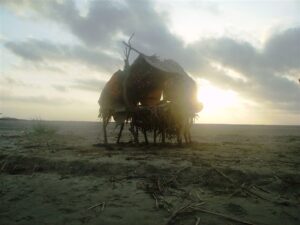Pakistan Prime Minister Imran Khan is determined to implement a $50-billion real-estate urbanisation project on the Bundal and Buddo mangrove islands in the Arabian Sea. Environmentalists are sounding the alarm bell. But the government argues that this will ease pressure on Karachi.

Pakistan’s environmentalists are unhappy about the government’s plan to build $50-billion modern cities on the Arabian Sea mangrove islands of Bundal and Buddo. Prime minister Imran Khan wants to be remembered as the builder of the two cities that will vie with the razzmatazz of Dubai – a dream destination for many a Pakistani.
But environmentalists warn that this has grave ecological consequences. The islands have dozens of species of sea snakes, migratory birds and plants, mainly mangroves. The islands’ shores are also nesting sites for rare green turtles.
Bundal and Buddo islands have been created from silt that the Indus river deposited in the sea over the decades. The two are among some 300 islands along Pakistan’s coastline. Bundal is spread over an area of 120 square km (about a fifth the size of Mumbai). Buddo is half its size.
The islands account for over 90 per cent of Pakistan’s mangrove cover, according to geographer Syed Jamil Hassan Kazmi. He argues that building a city over these will damage the islands’ natural environment and ecological systems.
Karachi-based film-maker Mahera Omar says that the once pristine mangrove forests are now in terrible shape with mud crabs clinging to tree stumps.
Ramsar Convention
Activists have petitioned against the development of cities on the islands. They say that the mangrove forests should be protected under the Ramsar Convention that stresses on “conservation and wise use of all wetlands through local and national actions”.
As Mahera Omar says, “new cities should not be an ecological nightmare for locals.”
Mangroves are an exclusive flora of a saline coastal ecology. These help minimise the risk of natural disasters such as urban flooding. Additionally, they also work as natural barriers against cyclones and tsunamis.
Threatening the livelihoods of fishing communities
Activists also point to the economic and cultural rights of the people who, for centuries, have earned their living on these two islands. They argue that the project is likely to exacerbate, rather than solve, the country’s ecological problems.
“It is an attack on the livelihood of fisher-folk,” Mohammad Ali Shah, chairman of the Pakistan Fisherfolk Forum, told the Dawn newspaper.
“These forests are fish and shrimp nurseries while these creeks from Karachi to Thatta serve as fishing grounds for the fishermen.”. He adds that the creeks leading to the sea around these islands have served as routes for fishing boats.
The Pakistan government, on the other hand, says that building modern cities on the islands will create around 150,000 jobs. Prime minister Imran Khan is determined to implement the enormous real-estate project estimated to be worth $50-billion, ostensibly to ease pressure on Karachi, an expanding megacity of 20 million people.
Edited by Pulkita Sharma

